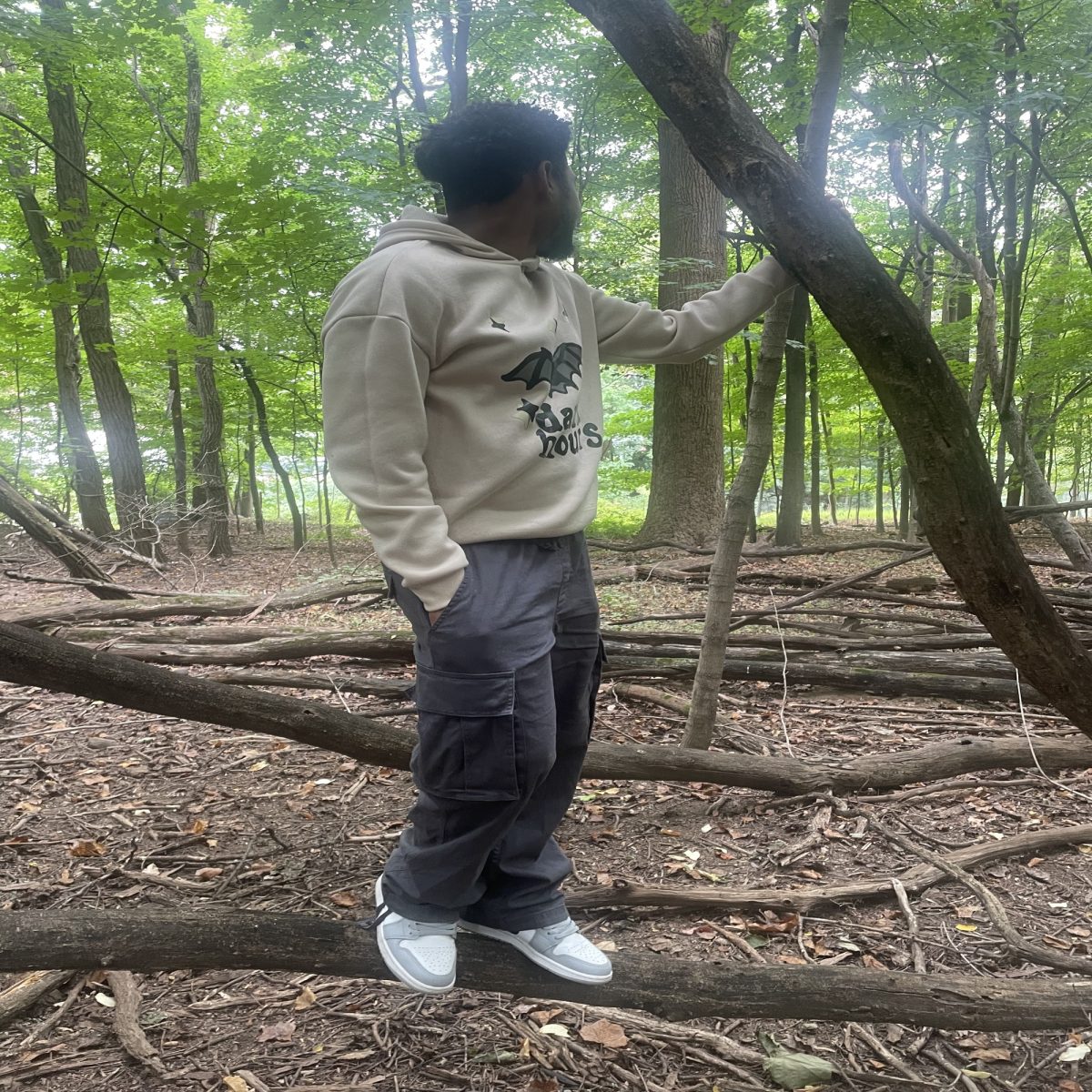A dozen people, ankle-deep in water, work in the basement of a house, shoveling debris into sturdy black garbage bags. The bags are passed up the stairs into waiting hands and along through the kitchen, in assembly line formation.
The volunteers pass the bags along swiftly and quietly. Their faces are obscured by white dust masks. They are intent on getting the job done, but a flicker of reality, marked by an almost imperceptible moment of eye contact, passes between them when certain items emerge from the basement.
A child’s pink wooden rocking horse, the wood swollen and warped.
A photo album still intact, but heavy and sagging with seawater.
Out on the porch, the last person in line ties each bag and passes it down to a trio of workers, who place the bags into shopping carts, beach trolleys, or red wagons; anything with wheels that will help them haul the debris away.
The house is located in Roxbury, Queens, a small community on the Rockaway Peninsula that, along with much of the Rockaways, bore the angry brunt of Hurricane Sandy. The cleaning crew consists largely of Mercy College students, staff and faculty who traveled to the location as part of Mercy Gives Back, the College’s global outreach initiative.
Jasmine Dumas, PACT Counselor and part of the Mercy Gives Back team, confirmed that as of the second day of volunteering, almost 40 students, faculty and staff had participated in the cleanup effort. Dumas is pleased with the turnout.
“In addition to volunteering, we are continually raising money and collecting supplies, so I think we’re hitting all the different areas.”
A Hurricane Sandy Supply Drive sponsored by PACT and the Physician Assistant program ran for two weeks on all three campuses, collecting much needed supplies such as non-perishable food items, cleaning supplies, blankets, batteries, and baby and personal hygiene items.
The house, which suffered extensive flood damage, belongs to the Prigge family: Barbara, her husband Harry, and their children Harold, 24, and Genevieve, 23. The Prigges have lived in the same house for 32 years, so much of the debris that is being hauled away consists of three decades of storage, memories, and evidence of a family life lived.
The whole family is part of the cleanup crew. Barbara Prigge is towards the end of the assembly line, laboring along with the 20 or so strangers in her house. Her attitude is unsentimental, that of a woman intent on getting the job done, but she is flanked by two women, lifelong friends from the neighborhood who support her by maintaining a lighthearted chatter as the debris comes from the basement nonstop, hour after hour.
Barbara passes the bags that come down the line, most of them heavy and leaking thick, rancid-smelling sea water, without comment, though occasionally, something will pass that merits special attention—a box filled with old LP records, another with children’s books from her career as a teacher—and she’ll retreat with her friends to the corner of the porch to see if anything can be salvaged.
Barbara is thankful her house wasn’t totally destroyed, but marks with her hand the spot where the flood reached, at least two feet into the first floor, leaving the insulation soggy and irreparable. The walls will have to be ripped out and replaced, and the family won’t be able to live there for at least a couple of months.
***
The community of Roxbury is more of a beach hamlet. Houses are close together, and many of the streets aren’t wide enough for cars to pass. Almost two weeks after the hurricane, the neighborhood is in constant motion. The same work is that being done in the Prigge house is happening at almost every other house, too. Roxbury residents, volunteers, and the U.S. military keep the neighborhood in a buzz of cleanup and repair. FEMA inspectors go from house to house, deciding whose is salvageable and whose should be condemned. Generators dot the neighborhood, resulting in a steady, low humming.
Around lunchtime, word passes from house to house that people should take a break and grab a bite to eat. Workers begin heading to the main square, shaped by the local firehouse, the church, and a playground that appears to still be intact and functional even though the equipment is covered with sand and tree branches.
Across from the firehouse, a banquette style table draped in a white tablecloth is covered with chafing dishes, Sterno candles burning underneath to keep the food warm. The table is staffed by Mercy Gives Back volunteers, and the food—raviolis, meatballs, garlic bread, cookies, water, tea, coffee, and hot chocolate—has been donated by Mercy College.
Since Roxbury continues to be without electricity or running water, food preparation continues to be a challenge. Lifelong resident Sharon Lehner is not pleased with the Red Cross’s lack of presence in Roxbury, but mostly she expresses her gratitude for the meal.
“This is the first hot food we’re seeing here. The Red Cross should thank Mercy College.”
She said she’s been using her generator-powered microwave to occasionally prepare meals, but is subsisting mainly on cold sandwiches.
Amanda De La Torre, Mercy College’s AmeriCorps VISTA representative, comments on the sense of community in Roxbury.
“People keep thanking us for coming, saying how nice it is to see us here.”
And as someone who is responsible with growing the volunteer effort at Mercy, she is pleased with the day’s turnout.
“The hurricane was an unfortunate event, but it has really brought Mercy students together. It’s great that they gave up their Saturday to be here.”
***
Back at the Prigge house after lunch, debris continues to flow out of the basement. Occasionally something is simply too heavy to pass up the stairs, so two or three people will haul it up and straight outside.
Two of these heavy lifters are MBA student Adlar Simmons, and media studies sophomore Avon Brown.
“I kept hearing on the news about the places that were hit hard, and I thought, “It’s time for me to show my support. I know I would want people to help out if it happened to me,” said Brown.
Simmons also grew tired of watching Sandy’s destruction on the news. He wanted to help in a more personal way, an effort he says he will not forget.
“First, I was surprised by the crabs crawling around on the stairs. But then, the things that really stood out were the nonstop pictures of people’s lives coming up the basement stairs…the entire life of a family was just washed away.”
Towards mid-afternoon, instead of the labor effort waning, the volunteers take things up a notch. The speed of the bags and boxes and unidentifiable objects getting passed down the assembly line increases, everything soggy and dirty from the filthy stew it was plucked from.
“Nails!”
The warning shout makes its way down the assembly line, along with pieces of jagged wood, nails treacherously sticking out every which way.
“They must be dismantling the built-in shelving down there,” says Barbara Prigge, as sounds of hammering and splintering wood rise up to the kitchen.
That seems to be a good sign. It’s the only thing left down there to throw away.
Despite the hours of heavy lifting, and the thick, sour sea water that has been spilling onto the shoes and pant legs of each and every person there, spirits remain high.
Vet tech sophomore Kamille Minors later commented on her impression of the effort.
“Everyone was helping each other out, working hard. No one was standing around or complaining.”
A couple of houses away, another group of Mercy volunteers are cleaning out another house, following the same procedure as they did at the Prigge home. Bag by bag, piece by piece, hour after hour, flood ravaged basements are thrown onto fast-growing garbage piles.
A trash heap is quickly growing at the edge of the beach, a block to the south. Volunteers sort the piles for ease of pickup when the dump trucks arrive.
A Roxbury resident who is helping with the difficult and dirty trash-sorting task politely asks the volunteers to place the glass carefully, so no stray pieces end up buried in the sand.
He wants to make sure his kids can play there again someday.
Standing in front of the trash heap on the edge of the beach, the bridge leading onto the Rockaway Peninsula is distant but visible, and even though it’s far enough away that the vehicles appear in miniature, it’s clear that there is just as much traffic as there was when the four Mercy College vans crossed the bridge earlier in the day.
Judging by the traffic, volunteers had been pouring into the Rockaways all day long. Trucks bearing famous logos such as Red Cross, U-Haul and Salvation Army, military Humvees, fire trucks, ambulances, yellow school busloads of volunteers, private cars with license plates representing several states throughout the Northeast, cleaning supplies like brooms and bleach visible in their rear windows, and an endless army of dump trucks, march in to collect the ever-piling up garbage heaps.
***
According to the Red Cross website, their response to Sandy is likely to be the largest relief effort of the last five years. Almost 6,000 workers, most of whom are volunteers, have been dispatched to hurricane affected neighborhoods and Red Cross shelters.
New York Cares and the New York City Mayor’s office continue to band together and send volunteers to clean, knock on people’s doors to be sure the relief effort has reached them, and distribute food and other emergency supplies to survivors. Occupy Sandy, in an unprecedented volunteer effort fueled by social media, has played an integral role in informing the 99 percent where to go each day to volunteer.
PACT Counselor Patricia DeAngelo describes the role social media has played in getting volunteers to Roxbury. DeAngelo went to high school with Genevieve Prigge, whose recent post on Facebook asked for available hands to help her family clean out their house. DeAngelo responded with four van loads of volunteers from Mercy College.
DeAngelo also scrolls through photos of cast members from The Real Housewives of New Jersey, personally made a trip to Roxbury drop off supplies after hearing about their devastation on Twitter.
Back at the Prigge house, the basement is almost empty and the speed of exiting debris finally begins to slow down. PACT Counselors start to make rounds, telling the volunteers the vans will be heading back to campus shortly. The Prigge family, still going strong, thanks Mercy volunteers profusely, and the Mercy volunteers begin to make their way back to the firehouse, discarding work gloves and dust masks into one of the endless piles of garbage that now makes up Roxbury.
At the firehouse, the PACT Counselors make sure everyone is accounted for. The food table volunteers are still serving, and say they’ll stay until all the food is gone. They estimate to have fed at least 100 people so far.
Everyone piles into the van, and some volunteers talk about their experience. Tiffany Ebanks, accounting junior, discusses the disbelief brought about by Sandy’s destruction.
“A lot of people thought Hurricane Irene wasn’t as bad as it was supposed to be, so people thought Sandy wouldn’t so be bad either. Genevieve (Prigge) said they used to wonder when they were kids what would happen if a hurricane came and washed everything away, and now they are in disbelief that it actually happened.”
Ebanks grew up in Canarsie, Brooklyn and felt she could identify with the families in Roxbury because she also grew up next to the water.
“It felt good being able to help someone clean. I would want someone to help if the same thing happened to me.”
Jessica Suarez, health sciences senior, commented on the massive effort that would be required for a long time to come.
“I walked out of the house I was working in and immediately saw more people who needed help, cleaning out their house, and carrying garbage down the beach. So I helped them, too.”
Jasmine Dumas, PACT Counselor, Mercy Gives Back team member, and shuttle driver for the day, swings the van into a FEMA relief center to drop off items from the college’s supply drive.
After a little more conversation about the experiences of the day, the van falls quiet as people plug into their ear buds or nod off to sleep, and Jasmine navigates the crew out of the long line of volunteers leaving the Rockaways for the day.









